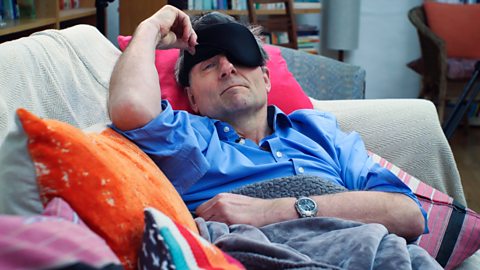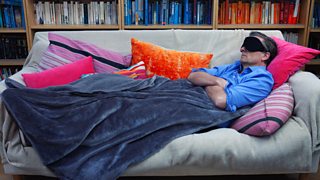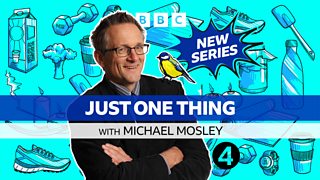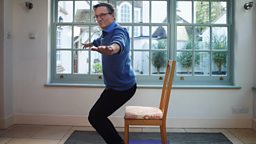Could a simple nap be the ultimate brain booster?
Do you think napping is lazy? Far from it! Research suggests that a quick day-time nap can unlock a wealth of positive health benefits, from lowering blood pressure to enhancing mood and boosting your memory. Recent research reveals that it could even help stave off heart disease.
In Just One Thing, Michael Mosley digs into the details to see if this is something you should make time for in your day.

The surprising benefits of napping
Dr Michael Mosley explains how napping can help your heart and brain.
Bring back the siesta!
In Ancient Rome, people rested at the sixth hour of the day, at noon. Many famous figures have also been big fans of a little daytime shut-eye. Winston Churchill apparently recharged himself with an afternoon nap, and former American President Bill Clinton did the same between meetings.
These days the practice of an afternoon nap has largely fallen out of favour, but recent research shows that a nap can be a wonderful thing for your mind and your body.
Asleep on the job?
Our body's natural circadian rhythms tend towards a dip in energy levels around 2 or 3pm, giving us the famous “mid-afternoon slump”. But if you work with this dip, rather than against it, there is a growing body of evidence that it can have a real benefit to your brain… and even your productivity.

Taking a 90-minute nap appears to boost your ability to learn new information, with nappers able to learn 10% more information later in the afternoon.
Far from making you slower and sleepier, studies have found that it could improve learning capacity and your memory. A study from UC Berkeley found that taking a 90-minute nap appears to boost your ability to learn new information, with nappers able to learn 10% more information later in the afternoon.
Another study found that a short nap could boost memory performance. Those who napped showed better memory of a complex maze task and were able to complete it more quickly than those who hadn’t.
So, a short daytime nap really does appear to have benefits for learning and memory – some even suggest an afternoon nap can sometimes lead to greater productivity benefits than just getting a longer night's sleep!
Your brain at work
Researchers think a short daytime kip is beneficial because it helps orchestrate a rehearsal of the experiences that you've had while you're awake. Taking some quiet time for a nap during the day can help your brain lay down memories, in a process called memory consolidation.
Cognitive neuroscientist and nap expert Professor Sara Mednick from the University of California, Irvine, explains that a power-nap of 20 minutes contains something called ‘Stage-Two sleep’ which is good for boosting attention, memory, and motor skills. As your brain enters sleep, it appears to literally rehearse the experiences you had earlier in the day to strengthen the connections between the different neurons that are encoding that information.
If you have time, longer naps may give you deeper benefits – for instance, creativity has been linked to Rapid Eye Movement sleep, or REM Sleep, which kicks in about 90 minutes in. REM Sleep is the period of sleep when your frontal lobe, your brain’s executive controller, is shut off. “This is when you can really start to have these really freewheeling connections in the brain, which is why REM sleep has been shown to be helpful for creativity,” says Prof Mednick.
Not only are there benefits for your brain – large studies have suggested that naps could also have a significant effect on your cardiovascular system.
Snooze for your heart
Naps can greatly tune down your fight or flight response and calm down your nervous system, says Prof Mednick. “It’s called a cardiovascular holiday.”

Indeed, one recent study of over 3,400 people aged between 35 and 75 found that an occasional daytime nap was associated with near half the risk for heart attack, heart failure or stroke compared to those who didn’t nap at all.
How to do it
If you want to feel more alert, even a nap of five minutes could give you a perk. Naps of different lengths may give you different benefits, but Prof Mednick says the quality of the sleep is most important.
In terms of WHEN to do it, if you’re worried about it affecting night-time sleep, avoid naps close to bedtime. This is because naps later in the day will have more “Slow-Wave sleep” and could influence your night-time sleep. You don’t want this to relieve some of the “sleep pressure” that builds up during the day and is one of the main drivers of night-time sleep.
And don’t write off a late morning nap! According to Prof Mednick, a nap around 11am may help pave the way to better night-time sleep, especially if you’re deprived of sleep.
Napping isn’t for everyone: some people find it impossible to nap. But if you have the time, the opportunity and want to try it, why not set aside 20 to 30 minutes in your day for a short doze and see what benefits it could bring you.
It’s a simple technique that could have profound benefits for your mind, your mood, and health. To find out more, listen to Just One Thing – with Michael Mosley: Take a Nap!

















































